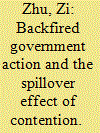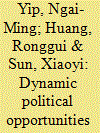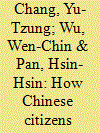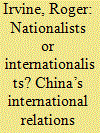|
|
|
Sort Order |
|
|
|
Items / Page
|
|
|
|
|
|
|
| Srl | Item |
| 1 |
ID:
153402


|
|
|
|
|
| Summary/Abstract |
This article investigates US responses to President Xi Jinping’s new model of major power relations in the context of American reflections on the engagement policy toward China. It argues that while the Obama administration endorsed the goal of avoiding confrontation between the two countries, it disagreed about how to reach the goal. Facing pressure to stand up against China due to the perceived failure of engagement policy, the administration became increasingly frank on the competition with China. The Sino-US strategic mistrust intensified and the chances of mishaps triggering an escalation increased when President Obama turned the presidency to Donald Trump.
|
|
|
|
|
|
|
|
|
|
|
|
|
|
|
|
| 2 |
ID:
153404


|
|
|
|
|
| Summary/Abstract |
This article discusses the interrelations between different episodes of contention in China through a case study of the Maoming anti-PX protests in 2014. Drawing on interviews and documentary data, the author specifies the spillover effect of previous anti-PX activism on the Maoming case. This article argues that preceding anti-PX protests helped bring about the Maoming protests, and explains how diffusion shaped protest dynamics in two aspects. First, it shows how local officials reacted to previous anti-PX episodes by taking pre-emptive measures designed to prevent mobilization in Maoming. However, this strategy backfired. Instead, it directly contributed to the anti-PX protests by facilitating cognitive liberation and activist networking. Second, this article shows how Maoming contenders also underwent a learning process. Previous anti-PX protests exerted an influence on the grievance framing in the Maoming protests and encouraged mobilization by increasing public expectations for success and legitimizing protest as a tactic. During the course of contention, Maoming protesters actively drew on their predecessors’ experiences, which shaped their own strategies accordingly.
|
|
|
|
|
|
|
|
|
|
|
|
|
|
|
|
| 3 |
ID:
153403


|
|
|
|
|
| Summary/Abstract |
Environmental contention is mounting all across China. In particular, protests against environmentally hazardous construction projects have become a frequent phenomenon, spreading well beyond China’s major cities. While these protests are gaining academic attention, they have mostly been analysed as separate phenomena in isolation from each other. Moreover, such grievance-based environmental contention has largely been investigated separately from ‘environmentalist’ activism underpinned by environmental organizations and broader environmental concerns. Yet recent protests against the construction of facilities such as waste incinerators and industrial facilities reveal the emergence of linkages and diffusion processes between cases and actors that challenge depictions of Chinese environmental contention as a necessarily purely localized and parochial affair. This article examines this new development in Chinese environmental activism through a detailed case study of an anti-incinerator campaign centred on a village in Hebei Province. It shows how linkages emerged horizontally between local residents and community activists involved in anti-incinerator campaigns elsewhere, and vertically between villagers and members of China’s nascent ‘no burn’ community, a group of actors highly critical of waste incineration in China. This article concludes that both types of linkages were crucial for the development and success of the villagers’ campaign. Although the opportunity for upward scale-shift based on active intra-community collaboration remains highly constrained, vertical ties and non-relational horizontal linkages ensure that the impact of environmental campaigns reaches beyond the immediate localities in which they occur.
|
|
|
|
|
|
|
|
|
|
|
|
|
|
|
|
| 4 |
ID:
153405


|
|
|
|
|
| Summary/Abstract |
While the literature on Chinese environmental politics tends to examine NGO actions and popular protests as two separate facets of environmental activism, such a tendency runs the risk of missing the linkages that have begun to emerge among environmental forces. This new phenomenon is highlighted with a case study of local opposition against the siting of an oil refining plant in Kunming through the lens of political opportunity theory. Two forms of linkages are identified, namely the linkages between local communities and local NGOs and the linkages between local and supra-local NGOs. These linkages emerged and developed through dynamic interactions between political opportunities and contentious actions. Citizen-initiated protests in Kunming pressured the local government to adopt a receptive attitude for the purpose of maintaining social stability, which paradoxically expanded political opportunities for NGO participation. The structural political environment of the locality indirectly facilitated collaboration between local and supra-local environmental NGOs by activating prior social networks among key NGO members. The analysis of the dynamic linkages among environmental forces reflects the prospects of a broader environmental movement and its relation to political contexts.
|
|
|
|
|
|
|
|
|
|
|
|
|
|
|
|
| 5 |
ID:
153406


|
|
|
|
|
| Summary/Abstract |
The rise of ‘rights talk’ in Chinese contentious politics attracts numerous attentions and debates. Does it indicate the rise of citizens’ ‘rights consciousness’ and the retreat of the state, or the continuation of the mass’s ‘rules consciousness’ and the state’s control? Based on a discursive analysis to a wide variety of texts during a ten-year struggle for pension rights, I argue that the discourses used by the protesting workers depended on concrete contexts and power relations, and the institutional design from the state promoted the workers’ rational justification to their interest requests. The strategic employment of ‘rights talk’ by the workers, on one side, displayed the state’s symbolic domination, which successfully prevented the radicalization of protests; on the other side, it suggested that only through the realization of ‘rule of law’ could the state’s management of social contentions turn from short term containment to long range institutional absorbing.
|
|
|
|
|
|
|
|
|
|
|
|
|
|
|
|
| 6 |
ID:
153407


|
|
|
|
|
| Summary/Abstract |
Based on a unique survey of non-governmental organization (NGO) practitioners from diverse backgrounds, the article examines how these NGO practitioners view their peers and people alike, and the interconnectedness, unity and solidarity of the NGO sector. The research has found that mutual awareness and trust is strong at the interpersonal level among NGO practitioners, yet their views on the collective existence of an NGO and activism community remain divided. In addition, preliminary statistical analysis shows that particular work experiences such as connections with other NGOs and participation in policy advocacy are associated with the optimism of a shared community of social activism. More importantly, the more one has—or feels one has—having peers across organizations, the more favorably one thinks of the whole activism community. Therefore, the key to ‘becoming a community’ for civil society in China lies in ‘having peers’ for individual activists and NGO practitioners.
|
|
|
|
|
|
|
|
|
|
|
|
|
|
|
|
| 7 |
ID:
153411


|
|
|
|
|
| Summary/Abstract |
While many studies have investigated Taiwanese people’s attitudes towards cross-Strait relations, few studies explore how Chinese people on the other side of the Taiwan Strait perceive the Taiwan issue. Using data collected via a telephone survey that covers 2,000 respondents from ten major cities in China in 2013, this article presents empirical evidence to fill this gap. It finds that most Chinese citizens’ attitudes are aligned with the government’s propaganda on cross-Strait relations. In particular, Chinese citizens have inaccurate perceptions of Taiwanese support for reunification with China. This article also finds that when Chinese respondents think that the city in which they live is more economically advanced than Taipei, the capital of Taiwan, they would support: (1) a faster pace towards a resolution, and (2) the use of military force to resolve cross-Strait confrontations. These findings offer new perspectives on studies of cross-Strait relations and Chinese nationalism.
|
|
|
|
|
|
|
|
|
|
|
|
|
|
|
|
| 8 |
ID:
153408


|
|
|
|
|
| Summary/Abstract |
Bystanders who were not stakeholders had often been mobilized into popular protests in China. Why did these bystanders step in to some protests and choose not to participate in other protests? What were the motivations and mobilizing mechanisms that brought the bystanders into the protests? Based on the case study of the Shishou Unrest in which about 70,000 bystanders were effectively mobilized to step into protests, this article reveals a two-stage mobilization strategy that the stakeholders started by turning a small number of bystanders into activists and then to mobilize more, other bystanders into protests. During the first mobilization stage, the stakeholders provided material incentives to the bystanders. During the second stage, activists appealed to the bystanders’ perception of extraordinary injustice related to the triggering event and the local society as a whole. The two-stage mobilization strategy successfully led a large number of bystanders step into the Shishou Unrest.
|
|
|
|
|
|
|
|
|
|
|
|
|
|
|
|
| 9 |
ID:
153409


|
|
|
|
|
| Summary/Abstract |
Resurgent nationalism has become an important driver of China’s foreign policy, and many countries are concerned about its evident new assertiveness. This article argues that closer attention to the vigorous internal debate among its international relations (IR) experts about their country’s future external strategies will add perspective to those concerns. It contends that the views of these experts provide probably the best available window into China’s thinking about its international options. China’s IR experts have been conspicuously divided about the appropriate balance of strategies for its transition from a previously cautious and inward-looking foreign policy to a more ambitious and proactive agenda. In particular, they differ about the relative emphasis that should be placed on the pursuit of national interests versus the advancement of international interests. This debate reflects contradictory elements in China’s foreign policy under Xi Jinping, some of which may potentially lead to confrontation and conflict while others hold out the prospect of continuing constructive engagement. Greater understanding of expert views within China about managing and reconciling these contradictory trends is likely to provide valuable insights for researchers and decision-makers in China and other countries.
|
|
|
|
|
|
|
|
|
|
|
|
|
|
|
|
| 10 |
ID:
153410


|
|
|
|
|
| Summary/Abstract |
As incomes have risen, quality-of-life issues have become increasingly prominent in China. How does the growing salience of quality-of-life issues affect Chinese politics and policy? Drawing on data from a Chinese national survey, the article examines the patterns of public attitudes toward food safety, a major quality-of-life concern in contemporary China. The article finds that the young, well-educated, as well as public sector employees tend to have a high level of concern for food safety risks. The article also finds that lack of confidence in food safety erodes public trust in both local and central authorities. These findings point to the importance of food safety as a public policy issue and help explain the Chinese leadership’s policy and institutional responses to food safety concerns.
|
|
|
|
|
|
|
|
|
|
|
|
|
|
|
|
|
|
|
|
|